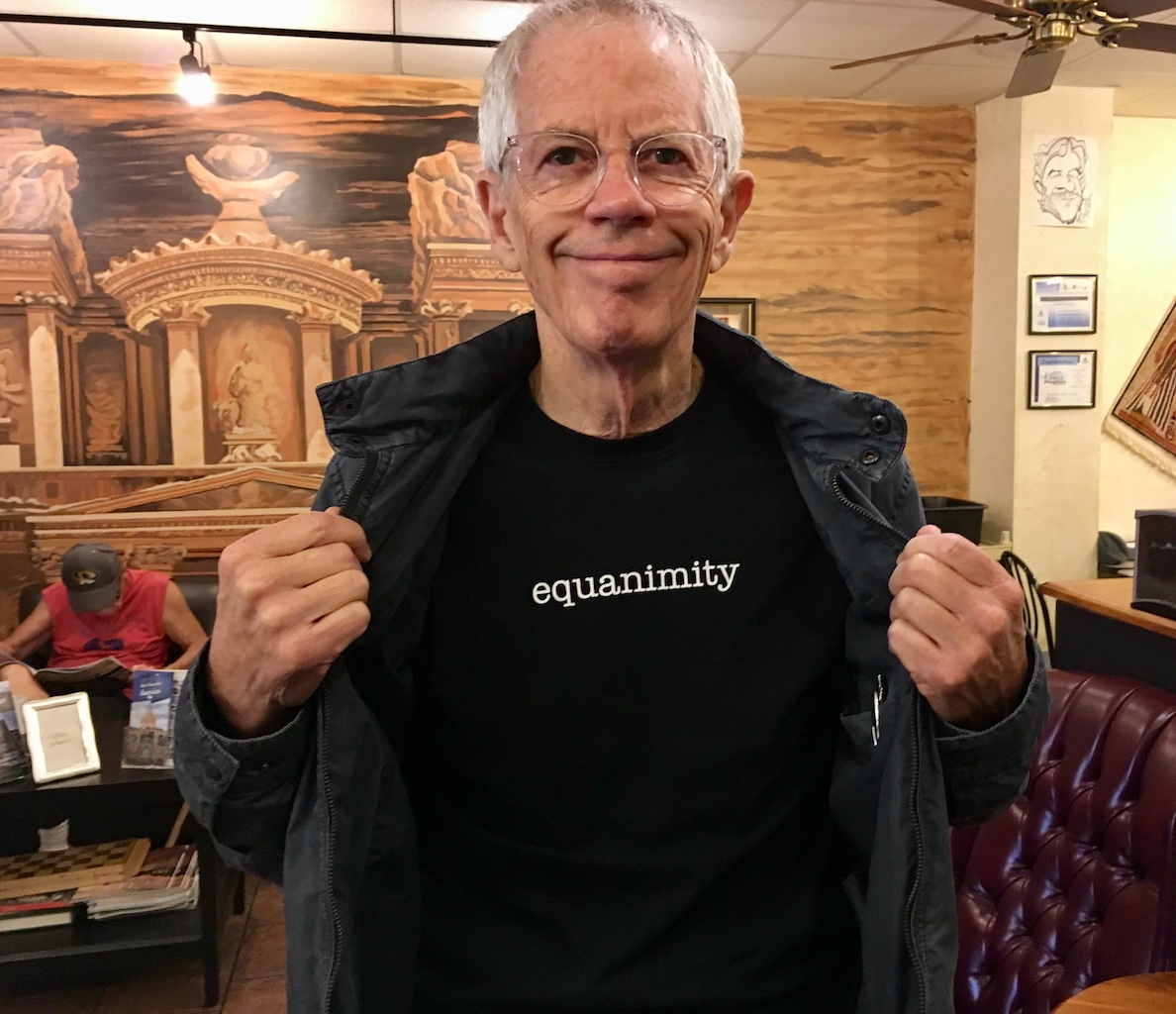 Yesterday was the 800th consecutive day on the cushion. I started meditating ten years ago but didn’t begin keeping a log of my daily practice until 2014. I’ve only missed two days in those four years. In all my reading about meditation there is general agreement it should be a daily practice. I sit for 30-45 minutes.
Yesterday was the 800th consecutive day on the cushion. I started meditating ten years ago but didn’t begin keeping a log of my daily practice until 2014. I’ve only missed two days in those four years. In all my reading about meditation there is general agreement it should be a daily practice. I sit for 30-45 minutes.
Category Archives: Philosophy
Experience Self vs. Memory Self
- Being happy “in” you life, vs. being happy “about” your life
- We don’t choose between experiences, we choose between memories of experiences
- We don’t think of the future as experience, we think of the future as anticipated memories
- Why do we give so much weight to memories, relative to the weight we give experiences?
- We do not attend to the same things when we think about life and when we actually live.
21 Lessons for the 21st Century
 I’m not up to reviewing Yuval Noah Harari’s latest book (21 Lessons for the 21st Century) but I liked this one by The Guardian. I really liked his two previous books, Sapiens and Homo Deus, and you can read some of my favorite excerpts in previous posts. I’m doing the same below but first I’ll say this book made me questions some of my long held beliefs. Nationalism, Religion and Immigration, just to name a few. This is a good example of what I mean when I suggest you ditch Facebook and TV news and read a book.
I’m not up to reviewing Yuval Noah Harari’s latest book (21 Lessons for the 21st Century) but I liked this one by The Guardian. I really liked his two previous books, Sapiens and Homo Deus, and you can read some of my favorite excerpts in previous posts. I’m doing the same below but first I’ll say this book made me questions some of my long held beliefs. Nationalism, Religion and Immigration, just to name a few. This is a good example of what I mean when I suggest you ditch Facebook and TV news and read a book.
“The Industrial Revolution has bequeathed us the production-line theory of education. In the middle of town there is a large concrete building divided into many identical rooms, each room equipped with rows of desks and chairs. At the sound of a bell, you go to one of these rooms together with thirty other kids who were all born the same year as you. Every hour a different grown-up walks in and starts talking. The grown-ups are all paid to do so by the government. One of them tells you about the shape of the earth, another tells you about the human past, and a third tells you about the human body.”
“If somebody describes the world of the mid-twenty-first century to you and it sounds like science fiction, it is probably false. But then again, if somebody describes the world of the mid-twenty-first century to you and it doesn’t sound like science fiction, it is certainly false.”
“When a thousand people believe some made-up story for one month, that’s fake news. When a billion people believe it for a thousand years, that’s a religion.”
“As a species, humans prefer power to truth.”
“Trust in the dollar and in the wisdom of the Federal Reserve is so firm that it is shared even by Islamic fundamentalists, Mexican drug lords, and North Korean tyrants.”
“A priest is not somebody who knows how to perform the rain dance and end the drought. A priest is somebody who knows how to justify why the rain dance failed.”
“In 2016, despite wars in Syria, Ukraine, and several other hot spots, fewer people died from human violence than from obesity, car accidents, or suicide.”
““Once AI makes better decisions than we do about careers and perhaps even relationships, our concept of humanity and of life will have to change.“”
““Democracy in its present form cannot survive the merger of biotech and infotech. Either democracy will successfully reinvent itself in a radically new form or humans will come to live in “digital dictatorships.””
“In the twenty-first century data will eclipse both land and machinery as the most important asset, and politics will be a struggle to control the flow of data. If data becomes concentrated in too few hands, humankind will split into different species.”
“So in the twenty-first century religions don’t bring rain, they don’t cure illnesses, they don’t build bombs—but they do get to determine who are “us” and who are “them,” whom we should cure and whom we should bomb.”
“We think we know a lot, even though individually we know very little, because we treat knowledge in the minds of others as if it were our own.”
“If you cannot afford to waste time, you will never find the truth.”
The Passing Scene
“Life is like looking out of the window while sitting in a train. You have no control over what appears in view. There’s even the moment after the train has paused, when it imperceptibly begins moving again. The appearance is that the train is motionless, but the scenery outside the window is moving. That, too, is a view that life sometimes gives us, a falsely relative view. We make no attempt to control the scene observed outside the train, knowing that wishing that it was something that it isn’t would be useless. And so it is, for the person who relaxes into Absolute awareness. Whatever passes across the screen of consciousness, whatever the organism experiences, is viewed dispassionately. The viewer acknowledges that all things change, and merely witnesses the changes impartially.”
— Abiding In Nondual Awareness (Robert Wolfe)
Suzuki Roshi on the inner experience of Zen: “The sights we see from the train will change, but we are always running on the same track. And there is no beginning or end to the track.”
Equanimity
Your Whole Life Is Borrowed Time
This post by David Cain was clearly written for me personally. Note the reference to “his local high street” in the third paragraph. Unclear about his reference but I spend my mornings at a coffee shop on High Street in Jefferson City. Coincidence? Perhaps.
A man with a boring job is on his way to work when his attention is caught by some unexpected detail in his otherwise familiar routine—a peculiar insect, a pattern in the concrete, a cryptic slogan on a t-shirt.
This detail seems extremely significant to him, but he doesn’t know why.
The strange sight wakes him up from the autopilot-mode by which he has been living his life. He is suddenly aware, for the first time, how complex and interesting his local high street is, and he stops to take it in.
Around him pass hundreds of distinctly different people, each a unique individual, driven by some unseen personal motivation. Shops are filled with thousands of trinkets, tools, snacks, and books. Delivery trucks roll past, music plays from somewhere, buildings rise above him. The scene is miraculous to him.
As he surveys the street, he witnesses something surreal: another version of himself is walking away from him, towards his usual bus stop, evidently not having had this same moment of self-awareness. For reasons he is never told, at that moment his life had apparently split in two.
However, his double does not make it onto the bus: as he waits, an air conditioning unit falls from a window above, killing him instantly. In a very unexpected and unstorylike way, his life ends.
The man has no idea what has happened, and never receives an explanation. The authorities never identify the person beneath the air conditioner, and the man never tells anyone what he witnessed because nobody would ever believe it.
There is nothing to do but carry on with his life. But he is a changed man.
Every morning he is amazed to find another whole day awaiting him. Every meal, every phone call, every greeting from his doorman feels like an undeserved gift, as though he’d mistakenly been given the honeymoon suite at a hotel. He feels grateful even for his problems.
None of the details of his life have changed, except one thing. He now lives with an awareness that he was never truly entitled to be alive; he just happened to be, and still is.
His ability to breathe, see, feel, and make choices now seems to him like an unearned, arbitrary status—one that he may freely enjoy, but which can be revoked at any time without explanation.
He hopes he never loses this sense that his life is essentially a bonus round, consisting entirely of borrowed time, not just from the day of his strange experience, but from the beginning.
There’s more to Mr. Cains post and it’s worth a read.
No one here
 “There is peace in this solitary spot on the globe because there is “no one” here. The human, who is merely part of the landscape, has no agenda, no ideas, no intent or motivation; he will not be rising from his chair in a moment to attempt to control something; to influence or change anything. Where could he begin to make any changes that would lastingly improve the situation?”
“There is peace in this solitary spot on the globe because there is “no one” here. The human, who is merely part of the landscape, has no agenda, no ideas, no intent or motivation; he will not be rising from his chair in a moment to attempt to control something; to influence or change anything. Where could he begin to make any changes that would lastingly improve the situation?”
— Living Nonduality (Robert Wolfe)
A perfect universe
“It is man’s cunning to endlessly solve problems; it’s the universe’s intelligence to have never a problem. Man’s dominion is one of constant control: the domain of the universe is one where everything competently, perfectly, manages itself: everything!
— Robert Wolfe
How to slow down time
There’s a character in the novel Catch-22 that spends his days playing horseshoes. He hates pitching horseshoes but doing it slows down time and makes his life longer. At least that’s the way I remember it. David Cain recommends mediation. “Lengthening our years by deepening our days.” And he calls “bunk” on the notion that time moves faster as we get older because we have less time remaining:
“You’re not accelerating towards your grave. It’s just a series of compounding illusions that tend to happen when we habitually ruminate about time. And there are things we can do to see through those illusions.”
I have little doubt that time — as we experience it — is an illusion. But it is a powerful one. Mr. Cain offers valuable insights in how to manage this imaginary resource.
A passing thought
“The noticing of a passing thought and the explosion of an ancient star are not unrelated phenomenon: both the product of a self-creating, self-destroying ubiquitous capability.”

